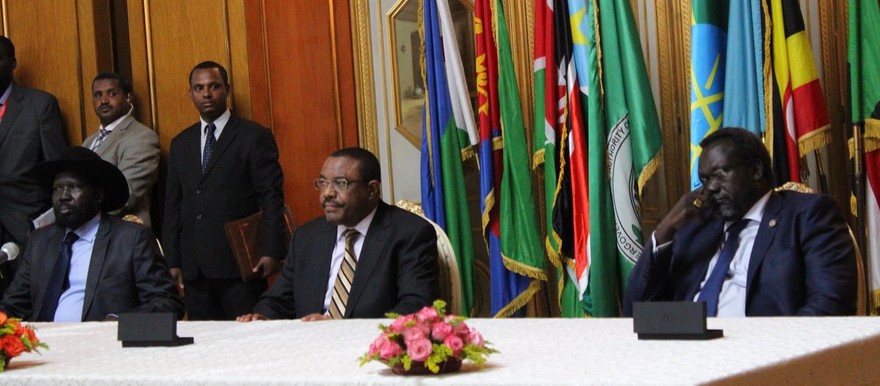Negotiators of the two South Sudanese warring parties have failed to meet a deadline set by the IGAD Assembly of Heads of State and Government for agreeing on the formation of a transitional government and ensuring humanitarian access.
Yesterday the deadline expired.
The deadline for a deal was set last June by East African leaders including the IGAD chairman Ethiopian Prime Minister Hailemariam Dessalegn, at an extraordinary summit meeting in Addis Ababa, Ethiopia.
He and other East African leaders resolved to take “punitive measures” against any party failing to honour their commitment to the peace process.
Hailemariam is also guarantor of the Agreement to Resolve the Crisis in South Sudan, which preceded the IGAD summit ultimatum by one month. The agreement required the warring parties to “immediately cease all hostile activities” and to “negotiate the terms of a transitional government of national unity.”
The Ethiopian leader is now being urged by at least one Western nation – Norway – to carry through with the threat of “punitive measures,” which may include economic restrictions or travel bans.
Norwegian Foreign Minister Børge Brende, in a statement issued late yesterday, said that missing the deadline was an “unacceptable failure.” He accused the warring parties of lacking seriousness and called for action by the UN Security Council, the African Union and IGAD.
“Despite the mediation team’s best efforts neither the Government of South Sudan nor the SPLM in opposition have engaged in peace talks seriously during the 60 day period,” he said.
“Along with our troika partners from the United Kingdom and United States, I condemn these failures by the parties,” he said, pointing out that peace talks have been on-going for seven months while the war continues.
“Regional leaders have previously called for punitive measures if the parties failed to secure peace by the agreed deadline. I call on the Inter-Governmental Authority on Development, the African Union and UN Security Council to immediately take appropriate action to bring peace to the people of South Sudan,” said Brende.
The United States and the United Kingdom, the two allies of Norway mentioned by Brende, are yet to confirm publically their support for this policy position.
Meanwhile, one of the negotiators at the Addis Ababa talks yesterday told Radio Tamazuj that he expected the talks to continue past the deadline, with direct discussions on security issues starting on Monday.
Yai Joseph, a member of the government delegation, confirmed that talks continued over the weekend involving all parties, with a focus on economic issues and the formation of the transitional government.
He said that talks will start on Monday between the two warring parties on security arrangements including implementation of the cessation of hostilities agreement.
“From tomorrow, Monday, direct discussions between the government and the Riek Machar group will start on the matrix of security issues,” he said.
He noted that there is still an outstanding dispute on the matter of withdrawal of foreign troops. This continues to be demanded by the opposition and rejected by the government.
On political issues, he expected discussions to continue with the participation of all delegations, including the civil society group, the other political parties and the SPLM ‘Group of Ten’.
File photo: Ethiopian Prime Minister Hailemariam Desalegn with Salva Kiir (left) and Riek Machar (right), 9 May 2014
Related:
Full text: IGAD summit decisions on South Sudan crisis (11 June)
Full text: ‘Agreement to Resolve the Crisis in South Sudan’ (10 May)




